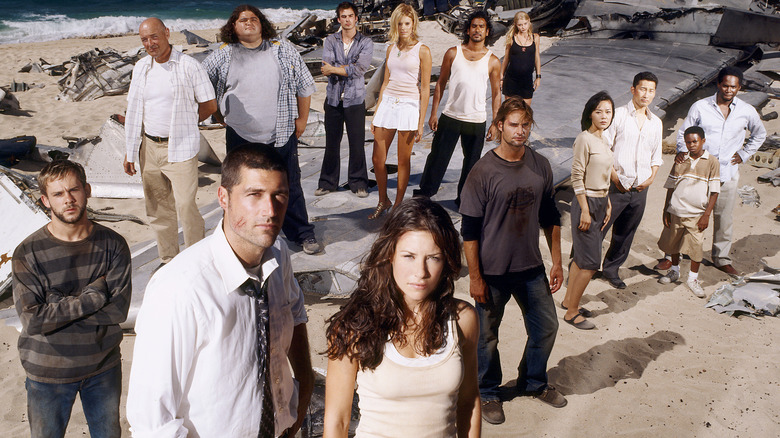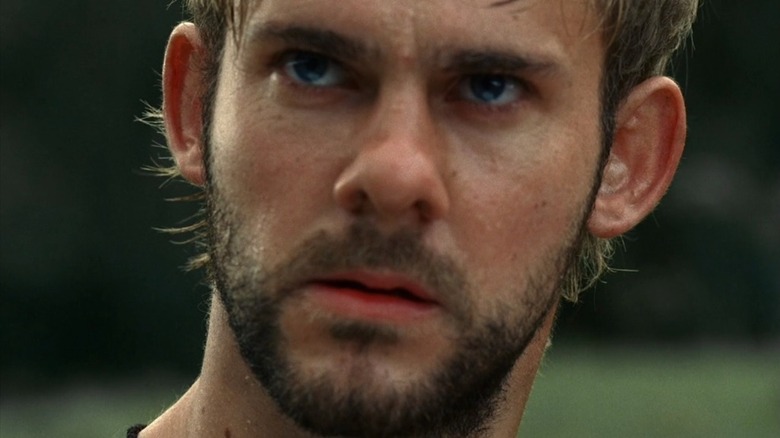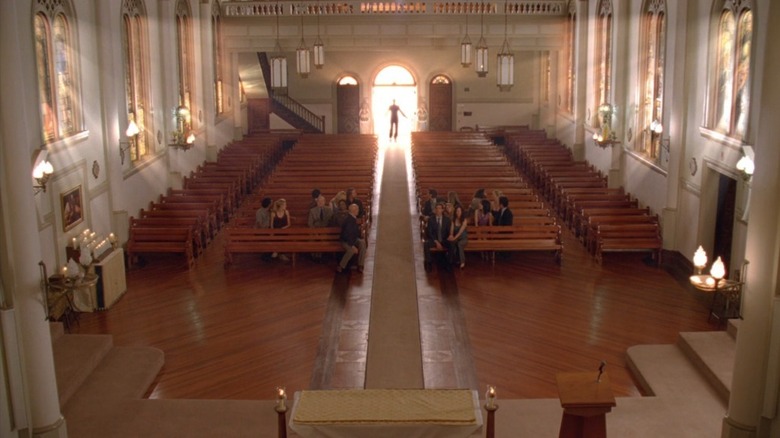Lost Ending Explained: No, They Weren't Dead The Whole Time ... But They Weren't Really Living, Either
Seventeen years ago today, Doctor Jack Shepard (Matthew Fox) opened his eyes in the middle of a bamboo forest on a mysterious island and jumped into action in the aftermath of a horrific plane crash, and television was never the same again. "Lost" stands tall as a game-changer in serialized broadcast TV, serving as perhaps one of the most effective trailblazers in making full use of the internet's affinity for encouraging fan theories and obsessing over dense mythology. By the time the show wrapped up its run, the fanbase ended up severely split over what "Lost" had even been about all along — the characters, or the never-ending stream of mysteries. The uneven final season tried to have it both ways by throwing in some unsatisfying and last-minute answers to questions that had long since become irrelevant. To its credit, however, creators Damon Lindelof and Carlton Cuse made their intentions emphatically clear on that front and chose the far better option in the divisive finale.
Well over a decade and a half later, the ending to "Lost" still comes with confusing baggage over whether the cast of characters had been "dead all along" ... and I'm here to reiterate that they most definitely weren't. The question isn't an unfair one, however, as a revisit of the finale makes it clear that — in classic "Lost" fashion — the characters hadn't truly been living until the very last moments of the series anyway.
'Guys ... Where Are We?'
The unsettling question above, posed by Charlie Pace (Dominic Monaghan) at the end of the two-part pilot episode, set the tone for the rest of the series. As Jack, John Locke (Terry O'Quinn), Kate Austin (Evangeline Lilly), James "Sawyer" Ford (Josh Holloway), Sayid Jarrah (Naveen Andrews), Hugo Reyes (Jorge Garcia), and the rest of the survivors scrambled to make sense of their unfriendly surroundings, this became the narrative driving force behind the first season(s) of "Lost." That implicit promise came with expectations of answering tantalizing questions like: what makes the island so special? Will the survivors could find a way off of it? And would they even survive long enough to do so? Polar bears, smoke monsters, the possibility of sinister "Others" inhabiting the island, and the group's ever-present suspicions of one another all combined to turn "Lost" into the weekly must-watch phenomenon that helped set the template for future pop culture hits like "Stranger Things" or "Game of Thrones."
But the idea that we only cared about the inexplicable events of the island because it was happening to this specific group of characters was a reality that went unnoticed by far too many viewers at the time. The clever flashback structure that permeated each and every episode in the early seasons was meant to emphasize that fact, drawing a direct connection between the plot of any given episode and the interior lives of whichever character received the spotlight. Instead, many of us tended to focus on the shocking reveals, coincidental (or fateful?) near-misses between characters who didn't know each other just yet, and breadcrumbs of clues that made the world-building of the show so compelling in the first place. It was a classic example of viewers missing the forest for the trees, latching onto the surface-level joys of the series and neglecting to pay enough attention to the impressive character-building going on right underneath our noses.
It's true that the show itself became preoccupied by going down plot-specific rabbit holes in an increasingly trippy attempt to keep audiences engaged and ratings high, which shifts some of the blame off ourselves and onto Lindelof and Cuse's storytelling instincts. At the same time, however, the one consistent aspect throughout the show's run proved to be the ever-shifting dynamics and relationships between the cast. Back when it was normal for television to stretch beyond merely eight or 10 episodes a season, "Lost" took full advantage of every hour it had and put its characters through an ever-evolving journey that made their eventual fates resonate as much as they did. In that light, the profound disconnect between the two halves of the audience leading up to the conclusion can't quite be rationalized by any neat-and-tidy answers.
So how do we explain the ending of "Lost"? I'm glad you asked.
'See You in Another Life'
In retrospect, it's easier to see that "Lost" had been building up to some sort of release of pent-up energy for quite some time before the final season debuted — for better or worse. Seasons 3-5 provided some of the highest highs to be found throughout the show's entire run, but season 5 toyed with the idea of giving the remaining cast of core characters a blank slate and making it so that their flight never crashed onto the island in the first place. The sky-high expectations following the detonation of a timeline-cleansing atom bomb (it's ... tough to explain to the uninitiated) resulted in a concluding season that couldn't possibly live up to the theories and guesses that fans had already concocted in the interim, even if the rush to wind down the series hadn't led to several self-inflicted problems on a script level. Let's put it this way: the less we speak of Sayid's zombie-like role or Claire Littleton's (Emilie de Ravin) wasted appearances throughout the final stretch of episodes, the better!
Continuing the trend of prior seasons, the last season of "Lost" came up with the idea of "flash-sideways" peeks at what initially appeared to be an alternate universe where the bomb's detonation actually had accomplished the job and Oceanic Flight 815 never crashed. The present-day events on the island had never been more confused or shockingly boring as they were here, leading the remaining cast on an oftentimes wheel-spinning journey that ultimately led to Jack and John Locke (who died but became reanimated by the island's original and malevolent deity. Again, it's a lot!) coming into their final conflict and Jack needing to fulfill his destiny by ... using a cork to plug a hole in a cave so that evil wouldn't consume the world.
As much as fans scoffed at this underwhelming reveal as to what purpose the show's main setting served all along, the final season drives home the fact that these characters were never more vibrant, alive, and truly themselves until they met each other after the crash. Remember the depths that Jack, Kate, Sayid, and others sink to after they actually escaped the island and left the others stranded there in season 5? That speaks to just how integral a part they played in each other's lives, with audiences uncovering layer upon layer as we got to know each character at the same time that they got to know each other.
The final reveal that the flash-sideways interludes were actually a glimpse into the shared afterlife that the survivors created for each other well after their deaths — some in previous episodes, some long after the events of the finale — may have been too much to throw at audiences at the time. It was easy to mistake the (admittedly vague) explanation of how the action on the island took place before the events of the seemingly alternate universe, which is how the "They were dead the whole time!" narrative became the prevailing interpretation of the finale among some circles. They're dead in the flash-sideways, sure, but their reunion in that church to "move on" from their current purgatory is as striking and lively depiction of the afterlife that I've ever seen. It proves Desmond Hume's (Henry Ian Cusick) repeated catchphrase of "See you in another life" correct, in the end.
All these years later and with the benefit of hindsight, a rewatch of the finale reveals an ambitious ending that strove to prioritize full-circle character journeys over a rote exercise in providing solutions for mysteries. "Lost" will never win over all its previous fans, but its ending is a perfect example of how the destination can be just as meaningful as the journey.


